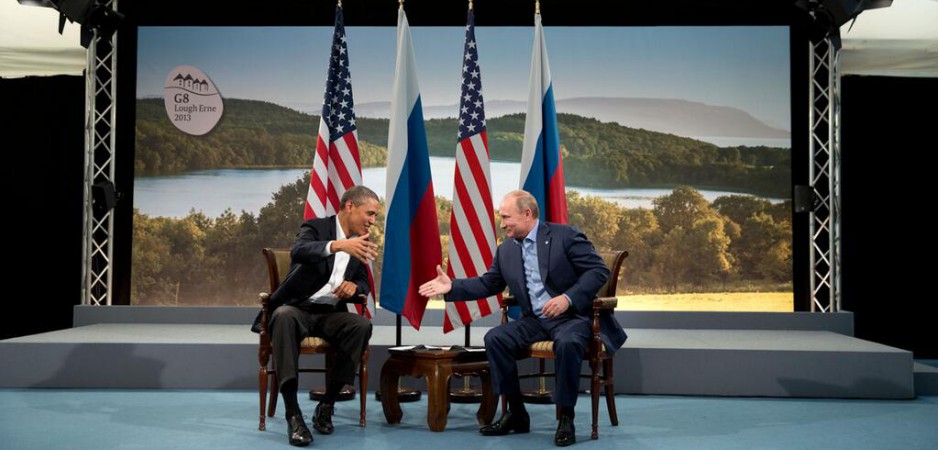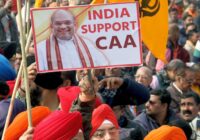The airstrikes on a hospital demonstrate how the US has failed miserably in Afghanistan and has no clue as to what to do.
In 52 BC, Vercingetorix threw down his arms at the feet of Julius Caesar. This marked the Roman victory over Gaul. Caesar went on to write Commentarii de Bello Gallico, while Vercingetorix was paraded as a prisoner in Rome and then strangled to death. Caesar claimed he had to invade Gaul to protect Rome. In reality, he was deep in debt. His overriding motive was to pay back his debt by conquering and plundering Gaul. Yet over time, Romans built roads and aqueducts in Gaul and other conquered lands. The civil law systems used by much of the world have their roots in Roman law. This article itself is written in the Roman alphabet.
The United States is the Rome of our times. It fashioned the existing global order at the end of World War II. The United Nations, the International Monetary Fund and the World Bank are all located in Uncle Sam’s backyard, making it easier to impose its will in international institutions. Hollywood and Harvard dominate the imagination of even its most ferocious rivals. The dollar is the world’s reserve currency, which means the US can get debt for free. The US is also a safe haven where insecure wealthy elites park their money. Russia and China might rattle their sabers from time to time, but their citizens are buying American property from New York to California.
The US does not just dominate economically and culturally. It is also the most formidable military power the world has ever seen. As the Peter G. Peterson Foundation points out, the US spent $610 billion on defense in 2014. This is 20% of federal spending and more than the combined defense expenditure of the seven other biggest military powers. The US can strike a target anywhere around the globe, blow up the world many times with its nuclear weapons and even exert power in space. Many world-changing technologies have emerged from US military research, including the Internet.
Yet for all its might, the US has come up short in Afghanistan. This week, President Barack Obama apologized because US airstrikes targeted a Médecins Sans Frontières (MSF) hospital in Kunduz, killing 12 staff members and wounding 37 others. The United Nations has called the attack “tragic, inexcusable and possibly even criminal.” MSF has long operated in dangerous areas and its people have been killed before. In fact, it left Afghanistan in 2004 for five years after five of its members were brutally murdered. This time, the US has killed more MSF people than the Taliban. It brings into stark focus the failure of Uncle Sam in its Afghanistan adventure, which this author predicted in 2010.
The airstrikes occurred because the Taliban had taken over Kunduz. This town borders Tajikistan and is the gateway to Afghanistan’s northern provinces. It is connected by road to Mazar-e-Sharif, which lies west and to Kabul, which lies south. It commands one of the most important drug smuggling routes in the region. Opium and heroin make their way from Afghanistan to Europe through Central Asia. The Taliban already controls much of the nearby rural areas and it was only a matter of time before it attacked Kunduz.
The ease with which Kunduz fell demonstrates how utterly out of its depth the US finds itself in places like Afghanistan, Iraq and Syria. Not too long ago, the US failed spectacularly in Vietnam despite throwing the kitchen sink at that tiny country, including using Agent Orange. Why does Uncle Sam come up short time and again in its overseas military adventures despite pouring much blood and treasure into them?
The answer to this question is neither simple nor straightforward. Yet a key factor that contributes to US failure is this country’s ignorance of the Old World. The US is a land of immigrants who embrace the overriding myth that they are an “exceptional nation” that can extend the frontier and function without any constraints. This enables Americans to create new technologies and world beating companies. Silicon Valley, home to Apple, Google and Facebook, personifies this American radicalism. The rest of the world is not the US and certainly not Silicon Valley. Resources are limited. Rivalries run deep. The past is ever present. Constraints are real.
In Afghanistan, this ignorance of the Old World has led to disastrous consequences. Most Americans have no clue that many luminaries of the Taliban were beneficiaries of American largesse when they were fighting the Soviets as mujahedeen. Once the Soviets left, the US forgot old friends like Ahmed Shah Massoud, a Tajik who was the best of the anti-Soviet rebels and nicknamed the Lion of Panjshir. He was hated by the largely Pashtun Taliban and killed two days before the suicide attacks on American soil.
The US invasion of Afghanistan succeeded spectacularly because far too many people in Afghanistan were chafing against the Taliban. However, the US was clueless as to what to do next. George W. Bush invaded Iraq and American focus shifted, leading to catastrophic consequences. The half-hearted process of state formation with foreign diplomats, administrators, soldiers and contractors was conceptually flawed and implemented horrendously.
 Afghanistan is a wild barren land where disparate tribes live in accordance with traditional norms. It is not a European nation state with a Weberian bureaucracy, old legal systems and a coherent national identity. Identities crisscross borders. Pashtuns in Afghanistan have more kinship with fellow Pashtuns in Pakistan than with Tajik or Uzbek Afghans. Sir Mortimer Durand once drew up the border of Afghanistan with utter disregard for the natives and with the sole aim of furthering British imperial power. The border and the Afghan national construct simply do not work.
Afghanistan is a wild barren land where disparate tribes live in accordance with traditional norms. It is not a European nation state with a Weberian bureaucracy, old legal systems and a coherent national identity. Identities crisscross borders. Pashtuns in Afghanistan have more kinship with fellow Pashtuns in Pakistan than with Tajik or Uzbek Afghans. Sir Mortimer Durand once drew up the border of Afghanistan with utter disregard for the natives and with the sole aim of furthering British imperial power. The border and the Afghan national construct simply do not work.
Pakistan provides a toxic mix into an already combustible cocktail. The “land of the pure” has feared implosion right from its outset because Khan Abdul Ghaffar Khan, the leading Pashtun leader in British India, was an associate of Mahatma Gandhi. Khan opposed the creation of Pakistan and Pashtuns voted against the Muslim League, the party of Pakistan’s founder, for decades. Unsurprisingly, Khan ended up spending more time in Pakistani jails than in British ones and died under house arrest in 1988.
Despite the quick US victory, the Taliban was bound to bounce back. The so-called Afghan national government is not national and certainly not a government. It is a bunch of feuding warlords fighting for scraps of patronage doled out by the US. People, particularly in rural areas, choose the Taliban over foreign troops who do not speak their language and disappear after brief tours of duty to the other side of the world. Furthermore, elements in Pakistan’s powerful military still back the Taliban. It is their way of keeping Pashtuns distracted and cultivating a natural ally that will back them against India.
Unlike Caesar in Gaul, Obama is trying to retreat, not conquer—to spend less instead of earn more. He uses drone strikes and airstrikes to fight the Taliban because he wants to save American blood and treasure. These strikes have long killed innocents, but they are now in focus because they hit a legendary humanitarian European organization.
Unlike Russia, the US prides itself for having a clear moral compass. That compass is increasingly erratic and will become more so until Americans become less ignorant of the Old World.
*[You can receive “The World This Week” directly in your inbox by subscribing to our mailing list. Simply visit Fair Observer and enter your email address in the space provided. Meanwhile, please find below five of our finest articles for the week.]
Vladimir Putin Rescues America
If Russia were doing its very best to tame the Middle East, America could dedicate itself to carefully defining a new and constructive role in international affairs.
It is not easy being Barack Obama these days. Every time he thinks he has a plan to disengage the United States from its disastrous foreign adventures, events beyond his control seem to get in the way. Iraq and Afghanistan continue as battlegrounds that America can’t seem to leave behind. Meanwhile, Syria beckons the warrior class with its unrealized potential for adding more weapons, more soldiers and more death to an already devastated killing field. It seems that like any good opiate, giving up killing is a really hard thing to do.
I give President Obama credit for at least talking about reduced reliance on our killing machine to lead America and the world to a better place. The problem is that he keeps pulling up way short of actually ending our contribution to ongoing international disasters and keeps getting… Read more
Europe Bound to Profit From Refugee Influx
Refugees should be seen as a blessing for the European economy, not a curse.
European leaders have publicly acknowledged their open door policy for refugees is not only a moral obligation, but also a calculated step that could benefit Europe in the long-term. This is something that politicians have admitted previously, but only confirmed in recent comments by Swedish Prime Minister Stefan Lovan, who said the intake of refugees “is an asset for our country and an asset in a global economy.”
The common worry that an increase in refugees will further burden Europe’s already struggling financial system, crowd its cities and both threaten and decay European culture—which have incidentally survived World Wars and were previously exported and scattered across the globe alongside colonial rule—is an exhausted and feeble argument.
European citizens who share the same right-wing sentiments as popular politicians like Geert Wilders and Viktor Orban must understand that while the European Union (EU) has received a total of 1.9 million refugees over the last three… Read more
A Social Perspective on Empowering Women in India
As India strives toward equal rights, a change in the perceptions of men and women is needed to reduce gender disparity.
In simple terms, empowerment means giving power or authority to an individual. The empowerment of women has been extensively debated and written about all over the world. Sociologist Dhruba Hazarika has rightly said that empowerment of women means equipping them to be economically independent, self-reliant, in addition to providing positive self-esteem to face any difficult situation. Women should be equipped enough to participate in any development process.
Women in Indian society have come a long way from the days of being worshipped as goddesses to being molested and harassed—gruesome domestic violence cases, acid attacks and rapes.
Statistics pertaining to crimes against women have been comprehensively recorded and collated by the National Crimes Records Bureau under various headlines such as trafficking, dowry deaths and rapes. These statistics are alarming. It is imperative for all Indians to tackle these problems and improve initiatives and legislation that empower… Read more
Muslims, Martyrs and Misconceptions
Legends based on polemic and fantasy distorted the image of medieval Nizari Ismaili Muslims, turning them into drug-crazed “assassins.”
Legends of the Assassins first appeared in medieval times and circulated widely in both the Middle East and Europe. Arising from the mysterious practices of the Nizari Ismailis and their unwavering devotion to their chief—the so-called Old Man of the Mountain—these myths depicted the group as a band of drugged murderers bent on senseless mayhem.
The prominence of these stories shows how readily fictions, if repeated long enough, may be confused with facts. These fanciful tales eventually became ingrained as historical reality for many citizens of the medieval world. These myths persist in modern times, with misleading analogies occasionally made in the media between suicide bombings of Islamist radicals and certain Nizari practices that led to their reputation as the world’s first political assassins.
From their beginnings in the 8th century, Ismailis represented a minority Shiite Muslim community that challenged the prevailing Sunni order under the Abbasid caliphs… Read more
Assange, Character Assassins and the Ghostwriter
Has Julian Assange been misrepresented in the unauthorized biography?
Julian Assange: The Unauthorised Autobiography is misleadingly mistitled, given that it was not written by Julian Assange. Nonetheless, he collaborated for a time with the author, Andrew O’Hagan, but never legitimated the work as his own statement or verified it with respect to facts. He certainly supplied information—precisely what we may never know—with a view to publication in satisfactory form. Nothing did take shape to his satisfaction, but the title was published regardless in 2012.
In early 2014, O’Hagan followed up with an article titled “Ghosting,” which relates impressions of his encounter with Assange. As the complementary insult for injurious aspects of the former work, it was received with much glee in the press. Even The Independent presented a cut-and-paste digest of “Ghosting” as an article, ending with its only noteworthy compliment—perhaps to suggest a fair and balanced nature. The latter quote, at least, is worth reproducing:
“At the time of the Egyptian uprising, [Hosni] Mubarak tried to…” Read more
The views expressed in this article are the author’s own and do not necessarily reflect Fair Observer’s editorial policy.
Photo Credit: Vadimmmus / Shutterstock.com
 We bring you perspectives from around the world. Help us to inform and educate. Your donation is tax-deductible. Join over 400 people to become a donor or you could choose to be a sponsor.
We bring you perspectives from around the world. Help us to inform and educate. Your donation is tax-deductible. Join over 400 people to become a donor or you could choose to be a sponsor.
Support Fair Observer
We rely on your support for our independence, diversity and quality.
For more than 10 years, Fair Observer has been free, fair and independent. No billionaire owns us, no advertisers control us. We are a reader-supported nonprofit. Unlike many other publications, we keep our content free for readers regardless of where they live or whether they can afford to pay. We have no paywalls and no ads.
In the post-truth era of fake news, echo chambers and filter bubbles, we publish a plurality of perspectives from around the world. Anyone can publish with us, but everyone goes through a rigorous editorial process. So, you get fact-checked, well-reasoned content instead of noise.
We publish 2,500+ voices from 90+ countries. We also conduct education and training programs
on subjects ranging from digital media and journalism to writing and critical thinking. This
doesn’t come cheap. Servers, editors, trainers and web developers cost
money.
Please consider supporting us on a regular basis as a recurring donor or a
sustaining member.
Will you support FO’s journalism?
We rely on your support for our independence, diversity and quality.











